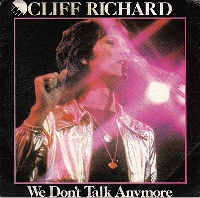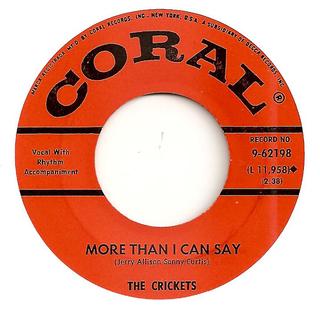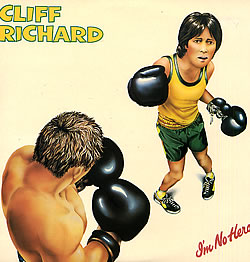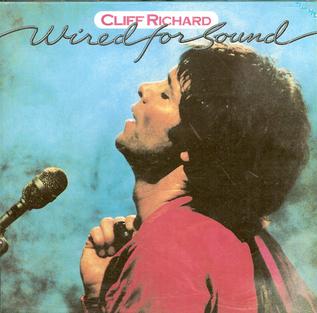
"Lost in Love" is a song recorded by the British/Australian soft rock duo Air Supply. The song was written by group member Graham Russell. The original version of the song appeared on the Life Support album in 1979 and was released as a single in Australia, reaching number 13 on the Kent Music Report. The song was remixed for the album of the same name in 1980 and this version was released as a single in the US, reaching number 3 on the Billboard Hot 100.

Hi Infidelity is the ninth studio album by American rock band REO Speedwagon, released on November 21, 1980, by Epic Records. The album became a big hit in the United States, peaking at number one on the Billboard 200, spending 15 weeks at number one. It went on to become the biggest-selling album of 1981, eventually being certified 10 times platinum by the Recording Industry Association of America.

Thunder in My Heart is the fifth album by the English singer-songwriter Leo Sayer, released in 1977. In 2006, a remixed dance version of the track, entitled "Thunder in My Heart Again", was released, credited to Meck featuring Leo Sayer. It reached No. 1 in the United Kingdom, and No. 16 in Australia. Along with a follow-up single, "Easy to Love", the song reached the Top 40 in the US and Canada.

Have You Ever Been in Love is the tenth studio album by recording artist Leo Sayer. It was originally released in November 1983 by Chrysalis (UK), and Warner Bros. (US) as the follow-up to his ninth album World Radio (1982). It was co-produced by the Grammy Award-winning Arif Mardin, in association with Alan Tarney, and Christopher Neil producing the other tracks. Sayer is credited as co-writer on the tracks "Don't Wait Until Tomorrow", and "Orchard Road".
William Peter Wingfield is an English record producer, keyboard player, songwriter, singer and music journalist.

"We Don't Talk Anymore" is a song recorded by Cliff Richard, written by Alan Tarney and produced by the Shadows' rhythm guitarist, Bruce Welch. It was released in 1979 as a single and reached number one in the UK Singles Chart in August 1979, remaining there for four weeks, Richard's tenth UK number one and his first since "Congratulations" in 1968.
Tarney/Spencer Band were a rock band formed in London in 1975 with Trevor Spencer on drums and Alan Tarney on lead guitar, bass guitar and lead vocals. Both had been in Australian bands, including James Taylor Move, prior to relocating to the United Kingdom, where they formed the duo. The group issued three albums, Tarney and Spencer (1976), Three's a Crowd (1978) and Run for Your Life (1979). Their single, "No Time to Lose" (1979), received airplay in the United States on album-oriented rock radio stations. It charted on the Billboard Hot 100 in both 1979 and again in 1981 upon re-issue. By the end of 1979, Tarney/Spencer Band had broken up and both founders undertook careers as songwriters, session musicians and record producers.

Always Guaranteed is the 28th studio album by Cliff Richard, released in 1987. The album peaked at number 5 in the UK Albums Chart, and spent a total of 24 weeks on the chart over 1987–88. The album was certified Platinum by the BPI and achieved sales over 1.3 million globally. The album was produced by Alan Tarney who had produced two of Richard's previous albums, Wired for Sound and I'm No Hero in the early 1980s and written Richard's highest selling single "We Don't Talk Anymore" in 1979. Tarney wrote all but one track on the album.

"Orchard Road" is a song by Leo Sayer released in February 1983 as the second single from his tenth album Have You Ever Been in Love. It peaked at number 16 on the UK Singles Chart, becoming his final top-twenty hit until his 2006 feature on "Thunder in My Heart Again".

"More Than I Can Say" is a song written by Sonny Curtis and Jerry Allison, both former members of Buddy Holly's band the Crickets. They recorded it in 1959 soon after Holly's death and released it in 1960. Their original version reached No. 42 on the British Record Retailer Chart in 1960. It has been notably performed by singers Bobby Vee and Leo Sayer.

"January February" is a song by Scottish singer Barbara Dickson released on 25 January 1980 by Epic Records. It peaked at #11 on the UK Singles Chart the week ending 12 April 1980, spending 10 weeks on the chart. It also made the Top 20 in the German and South African charts and 64 in Australia.

Endless Love: Original Motion Picture Soundtrack is the soundtrack album to the film of the same name. The album was released worldwide by Mercury Records and PolyGram in 1981.
Alan Tarney is an English record producer and musician. He was born in Northside, Workington, Cumberland, but spent his teenage years in Adelaide, Australia, where he met his songwriting and musical partner Trevor Spencer. He is best known for his association with Cliff Richard and producing "Take On Me" by A-ha.

I'm No Hero is the 23rd studio album by Cliff Richard, released in 1980. The album includes three hit singles, of which "Dreamin'" and "A Little in Love" were top 20 hits in both the UK and the US.

Wired for Sound is the 24th studio album by Cliff Richard, released in September 1981. The album peaked at number 4 in the UK album charts upon release, and spent a total of 25 weeks on the chart in 1981–82. The album was certified Platinum by the BPI, and achieved global sales of over one million.

"Devil Woman" is a 1976 single by British singer Cliff Richard from his album I'm Nearly Famous.
"There's a Honky Tonk Angel (Who'll Take Me Back In)" is a song best known for the 1974 recording by American country music artist Conway Twitty, who took it to number 1 on the Hot Country Singles chart. The song was written by Troy Seals and Denny Rice and originally released on Troy Seals' 1973 debut album Now Presenting Troy Seals.

September Morn is the thirteenth studio album by the American singer-songwriter Neil Diamond. Released in 1979, the album includes a disco version of the Motown song "Dancing in the Street" and a remake of "I'm a Believer".

"Dreamin'" is a song recorded by Cliff Richard from his 1980 album, I'm No Hero. The track was the first of three singles released and was the biggest hit from the album, becoming a top-ten hit in numerous countries including the UK and the US where it became his third and last top ten hit.
"Hangin' On" is a song by the Gosdin Brothers, released in August 1967. It has been recorded by numerous artists, including Joe Simon, Ann Peebles, Cher, Cliff Richard and Ann-Margret & Lee Hazlewood.














